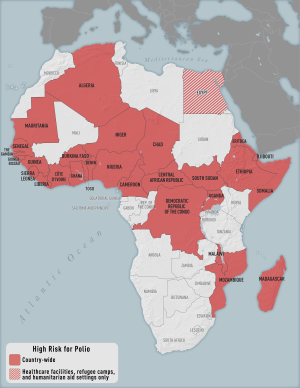Polio in Africa
Warning - Level 3, Avoid Nonessential Travel
Alert - Level 2, Practice Enhanced Precautions
Watch - Level 1, Practice Usual Precautions
Key points
- There are polio outbreaks in several countries in Africa.
- CDC recommends that all travelers to these countries be vaccinated fully against polio.
- Before traveling to these countries, adults who completed their routine polio vaccine series as children should receive a single, lifetime adult booster dose of polio vaccine.

Map: Countries in Africa where a booster dose of polio vaccine is recommended before travel (see larger map)
What is polio?
Polio is a crippling and potentially deadly disease that affects the nervous system. Good hand washing practices can help prevent the spread of this disease. Because the virus lives in the feces (poop) of an infected person, people infected with the disease can spread it to others when they do not wash their hands well after defecating (pooping). People can also be infected if they drink water or eat food contaminated with infected feces.
Most people with polio do not feel sick. Some people have only minor symptoms, such as fever, tiredness, nausea, headache, nasal congestion, sore throat, cough, stiffness in the neck and back, and pain in the arms and legs. In rare cases, polio infection causes permanent loss of muscle function (paralysis). Polio can be fatal if the muscles used for breathing are paralyzed or if there is an infection of the brain.
What is the current situation?
Polio outbreaks have been reported in the following African countries (map):
- Angola
- Benin
- Burkina Faso
- Cameroon
- Central African Republic
- Chad
- Democratic Republic of the Congo
- Ethiopia
- Ghana
- Nigeria
- Somalia
- Togo
- Zambia
The World Health Organization recommends that these countries require residents and long-term (4 weeks or more) visitors show proof of polio vaccination before leaving the country (See: WHO Statement of the Twenty-Second IHR Emergency Committee Regarding the International Spread of Poliovirus).
What can travelers do to prevent polio?
Get the polio vaccine. CDC recommends that all travelers to the countries listed above be vaccinated fully against polio. Adults who were fully vaccinated during childhood should receive an additional (single) lifetime booster dose of polio vaccine. Even if you were vaccinated as a child or have been sick with polio before, you may need a booster dose to make sure you are protected. See the Polio Vaccine Information Statement (VIS) for more information.
Clinician Information
For travelers going to countries with circulating poliovirus who have completed their routine polio vaccine series but who have not already received an adult booster dose, CDC recommends administering an inactivated poliovirus vaccine (IPV) booster dose.
See the Vaccine section in Chapter 4, Poliomyelitis, CDC Yellow Book, for specific vaccination details.
Additional Information
- Poliomyelitis in Epidemiology and Prevention of Vaccine-Preventable Diseases — The Pink Book
- Polio Vaccination: Information for Healthcare Professionals
No comments:
Post a Comment